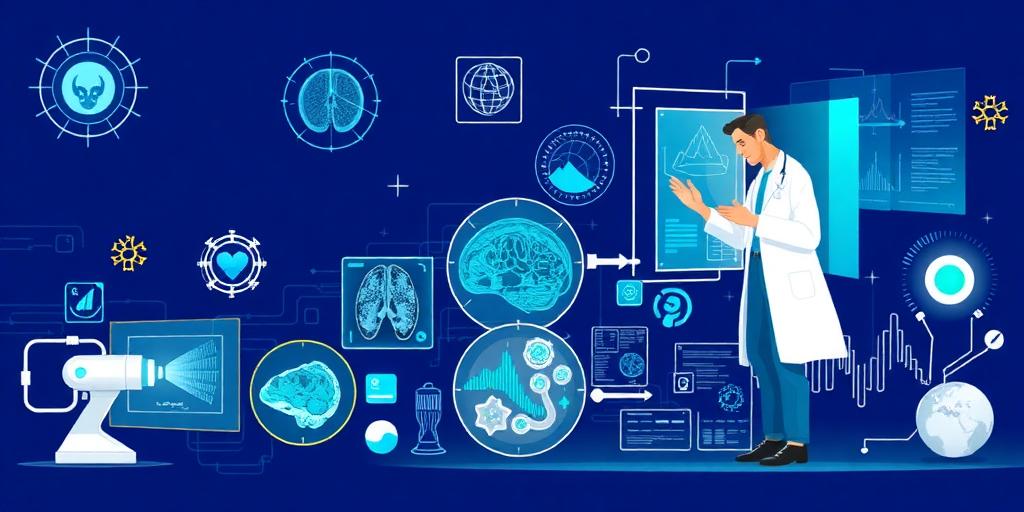Artificial Intelligence (AI) is no longer a futuristic concept within the medical realm; it is a present-day reality rapidly reshaping every facet of healthcare and medicine. From diagnostics to drug discovery, AI's capabilities are enhancing precision, accelerating innovation, and fundamentally transforming patient care. This authoritative overview delves into the pivotal ways AI is revolutionizing healthcare.
AI in Diagnostics and Medical Imaging: Enhancing Accuracy and Speed
One of the most profound impacts of AI in healthcare is evident in diagnostics and medical imaging. AI-powered algorithms are now capable of analyzing vast amounts of data from X-rays, MRIs, CT scans, and pathology slides with remarkable speed and accuracy. For instance, in radiology, AI diagnostics can identify subtle anomalies often missed by the human eye, such as early-stage cancers or neurological conditions. These systems assist clinicians by flagging suspicious areas, thereby reducing diagnostic errors and significantly improving patient outcomes. The integration of AI in pathology also allows for quicker and more precise analysis of tissue samples, leading to more timely and effective treatment plans.
Accelerating Drug Discovery and Development with AI
The traditional process of drug discovery is notoriously lengthy, expensive, and often unsuccessful. AI is dramatically shortening this timeline and increasing efficiency. Machine learning models can analyze complex biological data, predict molecular interactions, and identify potential drug candidates with unprecedented speed. This capability allows researchers to screen millions of compounds virtually, prioritize the most promising ones for experimental testing, and even design novel molecules from scratch. The result is a more targeted and cost-effective approach to developing new therapies, ultimately bringing life-saving medications to patients faster. This represents a significant leap in AI drug discovery and development.
Personalized Medicine: Tailoring Treatments with Predictive AI
Personalized medicine AI is at the forefront of tailoring healthcare to individual patient needs. By analyzing a patient's genetic profile, lifestyle data, medical history, and treatment responses, AI algorithms can predict disease risk, optimize treatment regimens, and forecast patient outcomes with a high degree of precision. This allows clinicians to move beyond a one-size-fits-all approach, enabling them to prescribe the most effective therapies for each individual. Predictive analytics powered by AI can also identify patients at high risk of developing certain conditions, facilitating early intervention and preventive care. This personalized approach promises to deliver more effective and less invasive treatments.
Optimizing Operational Efficiency in Healthcare Systems
Beyond direct patient care, AI is also driving significant improvements in the operational efficiency of healthcare systems. AI in hospital operations can optimize resource allocation, manage patient flow, predict equipment failures, and even streamline administrative tasks. For example, AI-driven scheduling systems can reduce wait times and improve staff utilization. Predictive models can anticipate surges in patient admissions, allowing hospitals to proactively allocate resources. Furthermore, AI can automate routine data entry and record-keeping, freeing up medical professionals to focus more on patient interaction. These advancements contribute to better overall healthcare delivery and reduced operational costs.
The Future Landscape: Challenges and Ethical Considerations
While the transformative potential of AI in healthcare is immense, its implementation is not without challenges. Ensuring data privacy and security, addressing algorithmic bias, and establishing clear regulatory frameworks are critical considerations. The ethical implications of AI making life-altering decisions also require careful deliberation. However, with ongoing research and collaborative efforts between AI developers, clinicians, and policymakers, these challenges are being systematically addressed to harness AI's full potential responsibly.
In conclusion, AI is unequivocally revolutionizing healthcare and medicine, ushering in an era of enhanced diagnostic accuracy, accelerated therapeutic development, highly personalized treatment, and streamlined operational processes. The continued integration of AI promises a future where healthcare is more precise, accessible, and ultimately, more effective for everyone.









